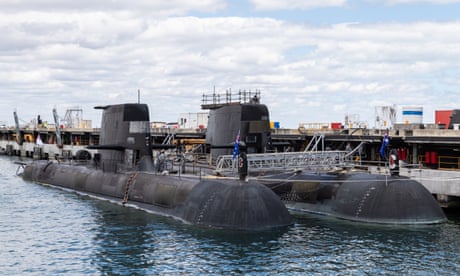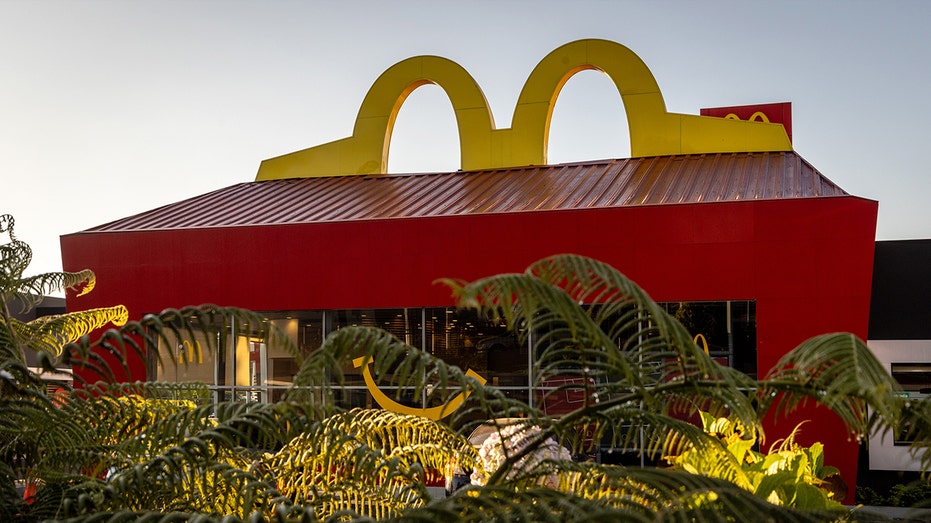- by foxnews
- 06 Apr 2025
New Collins-based submarine ‘best fit’ while waiting for Aukus, defence experts say
New Collins-based submarine ‘best fit’ while waiting for Aukus, defence experts say
- by theguardian
- 19 Jun 2022
- in news

Australia only has one option left, a group of former senior navy personnel say, and that's to build conventional submarines while waiting for the nuclear-powered program to begin.
Unions, industry and strategists are concerned about the capability gap as the existing Collins class fleet starts to retire before the new submarines arrive. The defence minister, Richard Marles, says that dealing with that gap is his top priority, and that he has an open mind on how to do it.
Now four respected defence experts have written to the defence department and to Marles to argue that a new submarine based on the existing Collins class is the "best fit".
The group comprises Admiral Peter Briggs (retired, former head of the navy's submarine capability team), Commodore Paul Greenfield (retired, former submariner and part of the Coles review of the Collins class), Commodore Terry Roach (retired, former director of submarine policy), and Dr John White, (an industrialist who led the building of Royal Australian Navy's frigate fleet).
A new boat, designed by Sweden's Saab/Kockums and built in Australia, could be in the water by 2032, Briggs told Guardian Australia. The first of the nuclear-powered submarines being planned under the Aukus agreement are unlikely to be operational before 2040, leaving Australia with a capability gap as the ageing Collins class reach the end of their useful life.
"We have tried every option except the right one," the group wrote in the brief they have sent to the government.
"Time is tight and there is now only one option. We need a lead-in submarine platform that meets Australia's circumstances, requirements and regulations."
A son of Collins is the "best fit", with world class sonars and combat systems, and will not be a new design or a different class to the existing fleet.
The four are in favour of nuclear-powered submarines in the future, but warn that the transition from the current fleet to a future one will take decades. Australia will take "at least as long" as the UK and US took in their transitions, which was 30 and 36 years, respectively.
They wrote that the first nuclear-powered submarine will not be ready by 2038, when the first refurbished Collins retires (most estimates say the nuclear versions will not be ready until at least 2040).
After the first retirement, another boat will retire every two years.
Building interim conventional submarines will ensure enough submariners will be adequately trained to staff them. There have long been concerns about a submariner shortage, and the difficulties in recruiting enough for an expanded force.
With a continuous build, the industrial workforce will similarly be kept up to speed, the group argued.
Briggs said that "even if" former defence minister Peter Dutton was right that the US would "sacrifice two of their own", it would take another 10 to 15 years for industry and the navy to gather the experience for full operational capability.
He said if the new government went to Swedish shipbuilder Saab/Kockums and asked how much, and how quickly, "you'd have the first submarine for sea trials in 2030, and commissioned in 2032". That could be the start of a continuous build, with the drumbeat of one conventional submarine being completed every year, and improved along the way.
This process would then transition into the nuclear-powered program while building the workforce and its expertise.
While some are pushing for a version of Sweden's new submarine, the A26, Briggs said he'd push for a new build of the Collins, but pointed out that there are skills and equipment that are transferable between the existing Collins (including the sustainment and life of type extension of that fleet) and the A26.
With design help from Saab/Kockums, the first batch could be quickly built with the existing Collins hull design, after which design changes could see it become a "son of Collins" or an "evolved Collins" submarine.
Briggs said, as others have, that there is a historical resistance in the defence department to doing business with Sweden, because of a turbulent start to the Collins program two decades ago. "But this is a new bunch, a new company," he said. "It's a no-brainer". Guardian Australia has approached Marles for comment.
- by foxnews
- descember 09, 2016
Viral photo of McDonald's PlayPlace prompts superfan to reveal fast-food chain's stray from nostalgia
McDonald's superfan shares the standout PlayPlaces he has seen after a viral photo showed a "heartbreaking" McDonald's PlayPlace in Franklin, Tennessee.
read more


